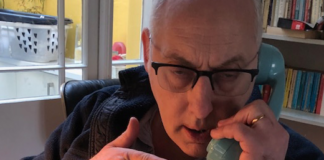- Football focus another trial - 6th January 2026
- A year to forget… - 5th January 2026
- Programme not well produced… - 2nd January 2026

In 42 years as a journalist (when he was trained to use simple language, avoiding jargon), for our Editor, Welshman Phil Parry, the crooked business people, politicians, or police officers have usually been men (although not exclusively), and this is put centre stage today with a new play that has taken Broadway by storm, which re-interprets a classic production for the #MeToo generation.
They have almost all been men, but I have to admit, though, that one was not.
 I was told about a woman in Cardiff who was running a crooked events ‘business’, with supposed recommendations on the marketing leaflets from high-profile companies.
I was told about a woman in Cardiff who was running a crooked events ‘business’, with supposed recommendations on the marketing leaflets from high-profile companies.
We simply rang up all these firms and they said they had never heard of her or the ‘business’, however when I showed her the evidence she stormed out of the television interview.
Yet apart from that I can’t remember a single time when the person who had duped the public, so becoming a target for me, was female.

It appears that (thankfully) things are changing, with women becoming more visible in influential positions, so presumably there will be a growing number of bad apples for me to expose, as well as good ones.
For example the Women’s Equality Network (WEN) for Wales declares: “We connect our network of organisational and individual members and ensure your voices and the issues that matter to you are heard by decision makers. Through our mentoring scheme, we are creating a pipeline of future leaders and ensuring that more diverse women are participating in political and public life”.

The Wales Assembly of Women (WAW) proclaims: “Wales Assembly of Women is an independent campaigning NGO accredited to the United Nations Economic and Social Council. Its representatives have attended every major United Nations world conference for women since 1985. It campaigns for women’s rights in Wales and the World. Membership is open to all women in Wales and to women with connections to Wales”.

Perhaps emphasising this changing attitude (which is not complete), the latest hit show on New York’s Broadway re-interprets the male hero of a classic play (‘The Crucible’) through the eyes of women.
‘John Proctor is the Villain‘ is about a classroom of clever high-schoolers who grapple with ‘The Crucible’ in the wake of #MeToo.
It opened to acclaim in April and was meant to close in early July, but popular demand kept extending its run.


It will vacate the stage in September only because the theatre has another play on deck, but Universal has recently picked up the film rights and tapped the talented young playwright, Kimberly Belflower, to adapt her sharp script for the screen.
Schools and universities across America are licensing the play for their own productions.
Ms Belflower wrote and set the play in 2018, and the synopsis about it announces: “…With deep wells of passion and biting humor, John Proctor is the Villain is a new comedy from a major new American voice, capturing a generation in mid-transformation, running on pop music, optimism, and fury, and discovering that their future is not bound by the past”.
In October 2017 Harvey Weinstein, a Hollywood producer, was accused of sexual abuse by multiple women, setting off a tidal wave of allegations against powerful men.

His conviction was in addition to a 16-year sentence after Weinstein was convicted of sex crimes in Los Angeles (LA).
Women across the world shared their experiences of harassment and violence; voices long silenced were suddenly heard and even believed.
It was a thrilling moment and an alarming one, in which long-standing rules about sex and power were being rewritten in real time.
This is the context for now re-examining one of the original play’s central tenets. The consensus view that John Proctor is a hero conveniently overlooks the fact that The Crucible’s drama stems from an affair he had with a 17-year-old orphan girl named Abigail, who worked for him as a servant before she was fired over their romance.
 In the cold light of today this behaviour seems dishonourable at best. “I think he sucks”, says one precocious student (played originally by Sadie Sink, of ‘Stranger Things’ fame, and now by Chiara Aurelia).
In the cold light of today this behaviour seems dishonourable at best. “I think he sucks”, says one precocious student (played originally by Sadie Sink, of ‘Stranger Things’ fame, and now by Chiara Aurelia).
So, it seems, the media are taking notice of how things are changing.
Soon there will be more women in positions of power, and a greater number of bad ones for me to have a go at!
I suppose that’s an advance of sorts…

The memories of Phil’s astonishing decades-long award-winning career in journalism (during which women were rarely exposed as corrupt officials) as he was gripped by the incurable disabling condition Hereditary Spastic Paraplegia (HSP), have been released in a major book ‘A GOOD STORY’. Order it now!
Tomorrow – how during that career Phil, has (almost) become used to the abuse he suffers, although this has become worse recently with the rise of the internet, and now this is highlighted by the alarm from MPs about a rise in abuse online linked to debates around immigration.

This concern comes after a Bank Holiday weekend of protests and counter protests at hotels used for asylum seekers, with 15 people arrested on Saturday and demonstrations continuing into Sunday.
He also looks at why diversity of the media is under threat.









